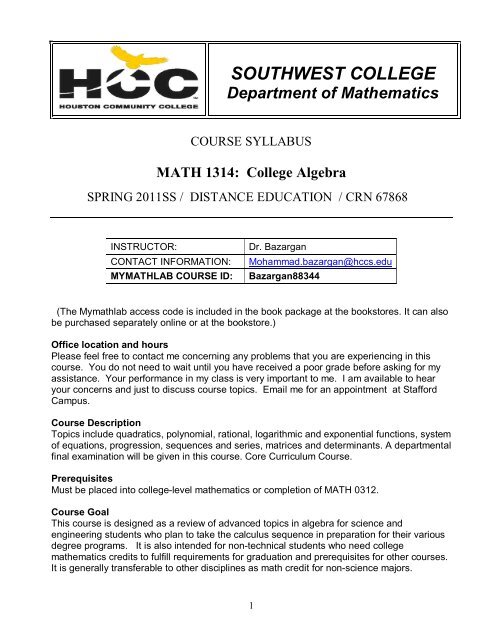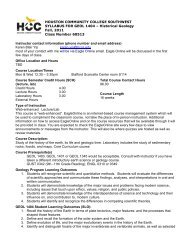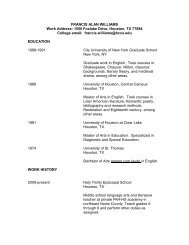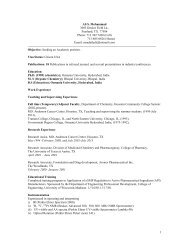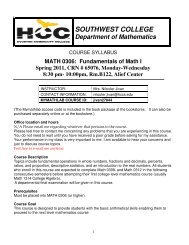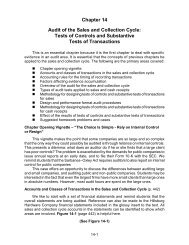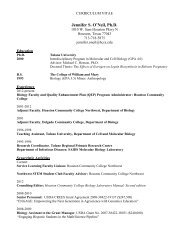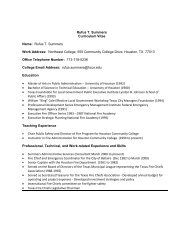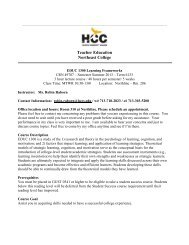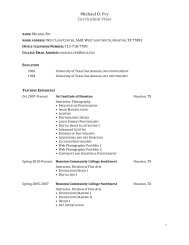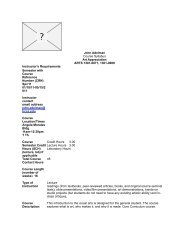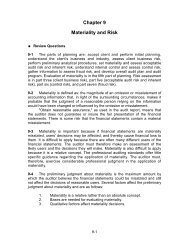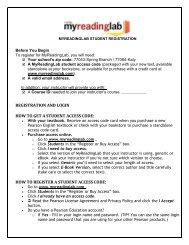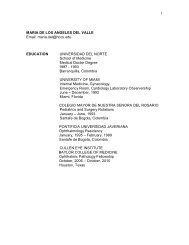HOUSTON COMMUNITY COLLEGE SYSTEM - HCC Learning Web
HOUSTON COMMUNITY COLLEGE SYSTEM - HCC Learning Web
HOUSTON COMMUNITY COLLEGE SYSTEM - HCC Learning Web
- No tags were found...
Create successful ePaper yourself
Turn your PDF publications into a flip-book with our unique Google optimized e-Paper software.
SOUTHWEST <strong>COLLEGE</strong>Department of MathematicsCOURSE SYLLABUSMATH 1314: College AlgebraSPRING 2011SS / DISTANCE EDUCATION / CRN 67868INSTRUCTOR:CONTACT INFORMATION:MYMATHLAB COURSE ID:Dr. BazarganMohammad.bazargan@hccs.eduBazargan88344(The Mymathlab access code is included in the book package at the bookstores. It can alsobe purchased separately online or at the bookstore.)Office location and hoursPlease feel free to contact me concerning any problems that you are experiencing in thiscourse. You do not need to wait until you have received a poor grade before asking for myassistance. Your performance in my class is very important to me. I am available to hearyour concerns and just to discuss course topics. Email me for an appointment at StaffordCampus.Course DescriptionTopics include quadratics, polynomial, rational, logarithmic and exponential functions, systemof equations, progression, sequences and series, matrices and determinants. A departmentalfinal examination will be given in this course. Core Curriculum Course.PrerequisitesMust be placed into college-level mathematics or completion of MATH 0312.Course GoalThis course is designed as a review of advanced topics in algebra for science andengineering students who plan to take the calculus sequence in preparation for their variousdegree programs. It is also intended for non-technical students who need collegemathematics credits to fulfill requirements for graduation and prerequisites for other courses.It is generally transferable to other disciplines as math credit for non-science majors.1
Student <strong>Learning</strong> Outcomes1. Solve algebraic equations andinequalities involving linear andnonlinear expressions.2. Examine and interpret the graphs ofcircles, polynomial functions, rationalfunctions, basic functions, and theirtransformations.3. Apply the basic knowledge of afunction in order to simplify functions,combine functions, and solveapplication problems involving linearand nonlinear functions.2Course Objectives1.1 Solve Quadratic Equations in one variable bythe method of factoring, square root property,completing the square and the quadratic formula.1.2 Solve radical equations, fractional equations,and equations of quadratic form.1.3 Solve linear inequalities and linear equationsinvolving absolute value, state the solution ininterval notation, and graph the solution.1.4 Solve non-linear (quadratic and rational)inequalities, state the solution in interval notation,and graph the solution.1.5 Solve exponential and logarithmic equations.1.6 Solve systems of linear and non linear in twovariables.2.1 Find the distance and midpoint between twopoints in the Cartesian Plane.2.2 Recognize the equation of a straight line, graphthe equation of a straight line, find the slope andintercepts of a line, know the relationshipbetween the slopes of parallel and perpendicularlines, and be able to determine the equation of aline from information such as two points on theline, or one point on the line and the slope of theline.2.3 Graph linear functions, quadratic functions,piecewise-defined functions, absolute valuefunctions, polynomial functions, rational functions,exponential functions, and logarithmic functions.2.4 Understand vertical and horizontal shifts,stretching, shrinking, and reflections of graphs offunctions.2.5 Recognize the equation of a circle, sketch thegraph of a circle, and find the equation of a circle.2.6 Determine the rational zeros of a polynomial.3.1 Apply the definition of a function, determine thedomain and range of a function, evaluateexpressions involving functional notation, simplifyexpressions involving the algebra of functions,graph functions by plotting points, use thedefinition of inverse functions, and given afunction find its inverse.3.2 Understand the inverse relationship betweenthe exponential and logarithmic functions.4. Perform basic matrix operations. 4.1 Perform operations with matrices.
16 WEEK CALENDARWeek 1 Equations and InequalitiesWeek 2 Equations and InequalitiesWeek 3 Equations and InequalitiesWeek 4 Graphs and FunctionsWeek 5 Graphs and FunctionsWeek 7 Graphs and FunctionsWeek 8 Polynomial and Rational FunctionsWeek 9 Polynomial and Rational FunctionsWeek 10 Polynomial and Rational FunctionsWeek 11 Exponential and Logarithmic FunctionsWeek 12 Exponential and Logarithmic FunctionsWeek 13 Exponential and Logarithmic FunctionsWeek 14 Systems and MatricesWeek 15 Systems and MatricesWeek 16 Final ExamTest Schedule:Test Chapters Covered on Test DateTest #1 1.4 – 1.8 , 2.1 – 2.3 3/11/11--3/13/11 OnlineTest #2 2.4 – 2.7 , 3.1 – 3.4 4/1/11--4/3/11 OnlineTest #3 3.5 – 3.6 , 4.1 – 4.6 4/29/11--5/1/11 OnlineFinal ExamComprehensive, 1.4 – 5.7, andDepartmental. 33 multiple choiceproblems.5/6/11 --5/7/11Online-OnsiteInstructional MethodsMATH 1314 is a required course for many students.As an instructor, I want my students to be successful. I feel that it is my responsibility toprovide you with knowledge concerning the field of mathematics, modeling good analyticalproblem solving strategies, and organizing and monitoring the success of each student withhomework that allows you to connect the information that you learn in this course toapplications in other course work and life in the real world.As a student wanting to learn about the field of mathematics, it is your responsibility to readthe textbook, submit assignments on the due dates, study for the exams, participate inclassroom activities, attend class, and enjoy yourself while experiencing the real world ofmathematics.As I believe that engaging the students in the learning is essential for teaching to beeffective, you will spend a portion of class time involved in problem solving activities. You will3
e involved in discussions with your classmates and your instructor. As you will want tocontribute to these discussions, you will need to come to class prepared to discuss, analyzeand evaluate information from your text and other assigned readings.Student AssignmentsAssignments have been developed that will enhance your learning. To better understand atopic, you will be given assignments on key information that you will need to remember foryour success in your career. Students will be required to successfully complete thefollowing:Mathematics Homework and QuizzesAll homework and quizzes must be completed online using MYMATHLAB. The MyMathLabgrade will be the equivalent of one test grade. The MyMathLab Course ID to be used forregistration purposes is bazargan88344 , and the school zip code is 77477. To register forMyMathLab and to access the homework, go to www.coursecompass.com.GradingYour instructor will conduct quizzes, exams, and assessments that you can use to determinehow successful you are at achieving the course learning outcomes (mastery of coursecontent and skills) outlined in the syllabus. If you find you are not mastering the material andskills, you are encouraged to reflect on how you study and prepare for each class. Yourinstructor welcomes a dialogue on what you discover and may be able to assist you in findingresources on campus that will improve your performance.Testing policy:There are three reviews and three tests. Review has 10 points, test has 90points.EXAM GRADE = 0.10(review grade) + 0.90(test grade)REVIEWS AND TESTS ARE ONLINE ON BLACKBOARD.HOMEWORK IS ONLINE ON MyMathLab.FINAL EXAM (ONLINE-ONSITE) IS ON BLACKBOARD. IT ISCOMPULSORY AND DEPARTMENTAL.Grading policy:Your final course grade is based on the following standard <strong>HCC</strong>S scale.FinalAverageFinal CourseGrade90 = Avg =10080 = Avg
Make-up exam will not be given in this course for any reason. However, thecompulsory final exam will be replaced for only one missed exam. The othermissed exams will receive zero.Homework policy:All homework must be completed online using MYMATHLAB.The sections corresponding to each exam should be completed BEFORE taking theexam.Calculators:Non-graphing Calculators are allowed in tests and final exam..Final Examination:The final examination is departmental and consists of 33 multiple-choice problems. Theproblems cover all the material required in the course.Instructional MaterialsTextbook:Essentials of College Algebra, AlternateEditionby Margaret L. Lial, David I. Schneider, &John HornsbyPublisher: Addison WesleyPub. Date: January 2007ISBN-13: 9780321491855********************The Distance Education Student Handbook contains policies andprocedures unique to the DE student. Students should have reviewedthe handbook as part of the mandatory orientation. It is thestudent's responsibility to be familiar with the handbook'scontents. The handbook contains valuable information, answers, andresources, such as DE contacts, policies and procedures (how todrop, attendance requirements, etc.), student services (ADA,financial aid, degree planning, etc.), course information, testingprocedures, technical support, and academic calendars. Refer to theDE Student Handbook by visiting this link:http://de.hccs.edu/de/de-student-handbook*********************<strong>HCC</strong> Policy Statement: Academic HonestyA student who is academically dishonest is, by definition, not showing that the courseworkhas been learned, and that student is claiming an advantage not available to other students.The instructor is responsible for measuring each student's individual achievements and alsofor ensuring that all students compete on a level playing field. Thus, in our system, theinstructor has teaching, grading, and enforcement roles. You are expected to be familiar with5
the College's Policy on Academic Honesty, found in the catalog. What that means is: If youare charged with an offense, pleading ignorance of the rules will not help you. Students areresponsible for conducting themselves with honor and integrity in fulfilling courserequirements. Penalties and/or disciplinary proceedings may be initiated by College Systemofficials against a student accused of scholastic dishonesty. “Scholastic dishonesty”:includes, but is not limited to, cheating on a test, plagiarism, and collusion.Cheating on a test includes:• Copying from another students’ test paper;• Using materials not authorized by the person giving the test;• Collaborating with another student during a test without authorization;• Knowingly using, buying, selling, stealing, transporting, or soliciting in whole or partthe contents of a test that has not been administered;• Bribing another person to obtain a test that is to be administered.Plagiarism means the appropriation of another’s work and the unacknowledged incorporationof that work in one’s own written work offered for credit.Collusion mean the unauthorized collaboration with another person in preparing written workoffered for credit. Possible punishments for academic dishonesty may include a grade of 0 orF in the particular assignment, failure in the course, and/or recommendation for probation ordismissal from the College System. (See the Student Handbook)<strong>HCC</strong> Policy StatementsClass Attendance - It is important that you come to class! Attending class regularly is thebest way to succeed in this class. Research has shown that the single most important factorin student success is attendance. Simply put, going to class greatly increases your ability tosucceed. You are expected to attend all lecture and labs regularly. You are responsible formaterials covered during your absences. Class attendance is checked daily. Although it isyour responsibility to drop a course for nonattendance, the instructor has the authority todrop you for excessive absences.If you are not attending class, you are not learning the information. As the information that isdiscussed in class is important for your career, students may be dropped from a course afteraccumulating absences in excess of six (6) hours of instruction. The six hours of class timewould include any total classes missed or for excessive tardiness or leaving class early.You may decide NOT to come to class for whatever reason. As an adult making the decisionnot to attend, you do not have to notify the instructor prior to missing a class. However, if thishappens too many times, you may suddenly find that you have “lost” the class.Poor attendance records tend to correlate with poor grades. If you miss any class, includingthe first week, you are responsible for all material missed. It is a good idea to find a friend ora buddy in class who would be willing to share class notes or discussion or be able to handin paper if you unavoidably miss a class.Class attendance equals class success.6
<strong>HCC</strong> Course Withdrawal PolicyIf you feel that you cannot complete this course, you will need to withdraw from the courseprior to the final date of withdrawal. Before, you withdraw from your course; please take thetime to meet with the instructor to discuss why you feel it is necessary to do so. Theinstructor may be able to provide you with suggestions that would enable you to complete thecourse. Your success is very important. Beginning in fall 2007, the Texas Legislaturepassed a law limiting first time entering freshmen to no more than SIX total coursewithdrawals throughout their educational career in obtaining a certificate and/or degree.To help students avoid having to drop/withdraw from any class, <strong>HCC</strong> has instituted an EarlyAlert process by which your professor may “alert” you and <strong>HCC</strong> counselors that you mightfail a class because of excessive absences and/or poor academic performance. It is yourresponsibility to visit with your professor or a counselor to learn about what, if any, <strong>HCC</strong>interventions might be available to assist you – online tutoring, child care, financial aid, jobplacement, etc. – to stay in class and improve your academic performance.If you plan on withdrawing from your class, you MUST contact a <strong>HCC</strong> counselor or yourprofessor prior to withdrawing (dropping) the class for approval and this must be donePRIOR to the withdrawal deadline to receive a “W” on your transcript. **Final withdrawaldeadlines vary each semester and/or depending on class length, please visit the onlineregistration calendars, <strong>HCC</strong> schedule of classes and catalog, any <strong>HCC</strong> Registration Office,or any <strong>HCC</strong> counselor to determine class withdrawal deadlines. Remember to allow a 24-hour response time when communicating via email and/or telephone with a professorand/or counselor. Do not submit a request to discuss withdrawal options less than aday before the deadline. If you do not withdraw before the deadline, you will receive thegrade that you are making in the class as your final grade.THE LAST DAY TO DROP A COURSE FOR SPRING 2011 IS THURSDAY APRIL 21 by4:30 pm.Repeat Course FeeThe State of Texas encourages students to complete college without having to repeat failedclasses. To increase student success, students who repeat the same course more thantwice, are required to pay extra tuition. The purpose of this extra tuition fee is to encouragestudents to pass their courses and to graduate. Effective fall 2006, <strong>HCC</strong> will charge a highertuition rate to students registering the third or subsequent time for a course. If you areconsidering course withdrawal because you are not earning passing grades, confer with yourinstructor/counselor as early as possible about your study habits, reading and writinghomework, test taking skills, attendance, course participation, and opportunities for tutoringor other assistance that might be available.Classroom BehaviorAs your instructor and as a student in this class, it is our shared responsibility to develop andmaintain a positive learning environment for everyone. Your instructor takes thisresponsibility very seriously and will inform members of the class if their behavior makes itdifficult for him/her to carry out this task. As a fellow learner, you are asked to respect thelearning needs of your classmates and assist your instructor achieve this critical goal.Use of Camera and/or Recording DevicesAs a student active in the learning community of this course, it is your responsibility to berespectful of the learning atmosphere in your classroom. To show respect of your fellow7
students and instructor, you will turn off your phone and other electronic devices, and will notuse these devices in the classroom unless you receive permission from the instructor.Use of recording devices, including camera phones and tape recorders, is prohibited inclassrooms, laboratories, faculty offices, and other locations where instruction, tutoring, ortesting occurs. Students with disabilities who need to use a recording device as areasonable accommodation should contact the Office for Students with Disabilities forinformation regarding reasonable accommodationsInstructor RequirementsAs your Instructor, it is my responsibility to:• Provide the grading scale and detailed grading formula explaining how student gradesare to be derived• Facilitate an effective learning environment through class activities, discussions, andlectures• Description of any special projects or assignments• Inform students of policies such as attendance, withdrawal, tardiness and make up• Provide the course outline and class calendar which will include a description of anyspecial projects or assignments• Arrange to meet with individual students before and after class as requiredTo be successful in this class, it is the student’s responsibility to:• Attend class and participate in class discussions and activities• Read and comprehend the textbook• Complete the required assignments and exams:• Chapter Exams, MyMathLab Homework, Final Exam• Ask for help when there is a question or problem• Keep copies of all paperwork, including this syllabus, handouts and all assignments8


